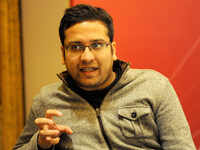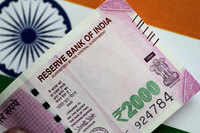Money mysteries: You may be richer than you think
Dhirendra Kumar | TNN | Dec 10, 2018, 12:23 ISTHighlights
- The financial decisions of many people are often based not on who they are, but on who they think they are, says Dhirendra Kumar
 (Representative image)
(Representative image)NEW DELHI: Whether you are a spender or a saver, a saver or an investor or an investor or a gambler, could all depend on how rich or poor you feel. Note that I said ‘feel’, not ‘are’. What’s even more interesting is that feeling poorer may lead to riskier behaviour.
Some time back, I read about some research on the psychological aspects of poverty and inequality which seems to jibe with something I have observed in the behaviour of savers and investors. A group of economists in the US set up an experiment for which they made a select set of government employees aware that they could find out their colleagues’ salaries through an online facility. Later, they surveyed both sets of people—those who knew their co-workers’ salaries, and those who did not know.
Before the study, the researchers had two opposing theories on how people would react to knowing others’ financial situation. While some thought that employees who find out that they were being paid less than others would be unhappy, the other theory was that they would see it as an opportunity for themselves to earn more and be pleased about earning less than their peers.
The study obviously showed that people who discovered they were paid less were unhappy about it. But, it turned out that those who were paid more than their peers were not happy about it either, but rather, were just indifferent. The study concluded that knowing about salaries had “negative effect on workers paid below the median for their unit and occupation” but had “no effect on workers paid above the median.”
So how is this important to saving and investing? Relatively prosperous people, with stable incomes, often don’t have any savings because they feel that only the rich can have savings. Often, they have some vague notion that a bonanza will happen which might make them rich and then they will invest all that money. To take just one comparison, a couple with a ₹14 lakh annual income felt they were not prosperous enough to save like ‘rich’ people do and someone who earned about half of that was steadily putting away ₹10,000 a month in a balanced fund.
Interestingly, these people feel investing involves taking a risk and getting good returns. They feel that since they are not prosperous, they can only keep their money in banks or in the PPF, but provide no real chance of earning any meaningful returns. This is often seen as an ‘investor education’ issue but really isn’t. It’s a cultural and psychological issue that can be solved only by self-awareness about what one is doing.
(The author is the founder and CEO of Value Research)
Some time back, I read about some research on the psychological aspects of poverty and inequality which seems to jibe with something I have observed in the behaviour of savers and investors. A group of economists in the US set up an experiment for which they made a select set of government employees aware that they could find out their colleagues’ salaries through an online facility. Later, they surveyed both sets of people—those who knew their co-workers’ salaries, and those who did not know.
Before the study, the researchers had two opposing theories on how people would react to knowing others’ financial situation. While some thought that employees who find out that they were being paid less than others would be unhappy, the other theory was that they would see it as an opportunity for themselves to earn more and be pleased about earning less than their peers.
The study obviously showed that people who discovered they were paid less were unhappy about it. But, it turned out that those who were paid more than their peers were not happy about it either, but rather, were just indifferent. The study concluded that knowing about salaries had “negative effect on workers paid below the median for their unit and occupation” but had “no effect on workers paid above the median.”
So how is this important to saving and investing? Relatively prosperous people, with stable incomes, often don’t have any savings because they feel that only the rich can have savings. Often, they have some vague notion that a bonanza will happen which might make them rich and then they will invest all that money. To take just one comparison, a couple with a ₹14 lakh annual income felt they were not prosperous enough to save like ‘rich’ people do and someone who earned about half of that was steadily putting away ₹10,000 a month in a balanced fund.
Interestingly, these people feel investing involves taking a risk and getting good returns. They feel that since they are not prosperous, they can only keep their money in banks or in the PPF, but provide no real chance of earning any meaningful returns. This is often seen as an ‘investor education’ issue but really isn’t. It’s a cultural and psychological issue that can be solved only by self-awareness about what one is doing.
(The author is the founder and CEO of Value Research)
Download The Times of India News App for Latest Business News.










































All Comments ()+^ Back to Top
Refrain from posting comments that are obscene, defamatory or inflammatory, and do not indulge in personal attacks, name calling or inciting hatred against any community. Help us delete comments that do not follow these guidelines by marking them offensive. Let's work together to keep the conversation civil.
HIDE